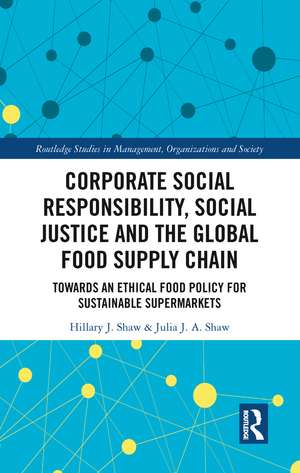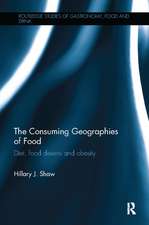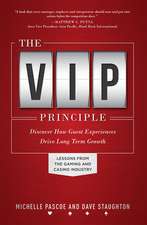Corporate Social Responsibility, Social Justice and the Global Food Supply Chain: Towards an Ethical Food Policy for Sustainable Supermarkets: Routledge Studies in Management, Organizations and Society
Autor Hillary Shaw, Julia Shawen Limba Engleză Paperback – 31 mar 2021
In the context of a variety of hard and soft law solutions, with a particular focus on corporate social responsibility (CSR), the authors explore the current relationship between all actors in the global food supply chain. Corporate Social Responsibility, Social Justice and the Global Food Supply Chain also provides a comprehensive and interdisciplinary response to current calls for reform in relation to social and environmental justice, and proposes an alternative approach to current CSR initiatives. This comprises an innovative multi-agency proposal, with the aim of achieving a truly responsible and sustainable food retail system. Because only by engaging in the widest possible participatory exercise and reflecting on the urban locale in novel, material and cultural ways, is it possible to uncover new directions in understanding, framing and tackling the modern phenomena of, for instance, food deserts, obesity, nutritional poverty and social injustice. Corporate Social Responsibility, Social Justice and the Global Food Supply Chain engages with a variety of disciplines, including, law, economics, management, marketing, retailing, politics, sociology, psychology, diet and nutrition, consumer behaviour, environmental studies and geography. It will be of interest to both practitioners and academics, including postgraduate students, social scientists and policy-makers.
| Toate formatele și edițiile | Preț | Express |
|---|---|---|
| Paperback (1) | 382.54 lei 43-57 zile | |
| Taylor & Francis – 31 mar 2021 | 382.54 lei 43-57 zile | |
| Hardback (1) | 1000.13 lei 43-57 zile | |
| Taylor & Francis – 4 feb 2019 | 1000.13 lei 43-57 zile |
Din seria Routledge Studies in Management, Organizations and Society
-
 Preț: 311.41 lei
Preț: 311.41 lei -
 Preț: 379.69 lei
Preț: 379.69 lei -
 Preț: 392.61 lei
Preț: 392.61 lei -
 Preț: 309.04 lei
Preț: 309.04 lei -
 Preț: 311.59 lei
Preț: 311.59 lei -
 Preț: 325.53 lei
Preț: 325.53 lei -
 Preț: 324.68 lei
Preț: 324.68 lei -
 Preț: 311.26 lei
Preț: 311.26 lei -
 Preț: 309.82 lei
Preț: 309.82 lei -
 Preț: 311.59 lei
Preț: 311.59 lei -
 Preț: 308.96 lei
Preț: 308.96 lei -
 Preț: 287.60 lei
Preț: 287.60 lei -
 Preț: 288.71 lei
Preț: 288.71 lei - 9%
 Preț: 866.18 lei
Preț: 866.18 lei -
 Preț: 332.89 lei
Preț: 332.89 lei - 18%
 Preț: 1051.55 lei
Preț: 1051.55 lei -
 Preț: 486.38 lei
Preț: 486.38 lei - 18%
 Preț: 1114.98 lei
Preț: 1114.98 lei -
 Preț: 467.44 lei
Preț: 467.44 lei -
 Preț: 412.03 lei
Preț: 412.03 lei - 15%
 Preț: 427.16 lei
Preț: 427.16 lei - 18%
 Preț: 997.90 lei
Preț: 997.90 lei - 18%
 Preț: 1110.74 lei
Preț: 1110.74 lei - 18%
 Preț: 1110.11 lei
Preț: 1110.11 lei - 18%
 Preț: 730.36 lei
Preț: 730.36 lei -
 Preț: 484.69 lei
Preț: 484.69 lei -
 Preț: 374.27 lei
Preț: 374.27 lei - 18%
 Preț: 1068.88 lei
Preț: 1068.88 lei - 18%
 Preț: 841.18 lei
Preț: 841.18 lei - 18%
 Preț: 1060.52 lei
Preț: 1060.52 lei - 18%
 Preț: 1126.82 lei
Preț: 1126.82 lei - 25%
 Preț: 851.82 lei
Preț: 851.82 lei - 15%
 Preț: 565.01 lei
Preț: 565.01 lei - 18%
 Preț: 1170.84 lei
Preț: 1170.84 lei - 18%
 Preț: 1114.30 lei
Preț: 1114.30 lei - 18%
 Preț: 1061.93 lei
Preț: 1061.93 lei - 18%
 Preț: 1054.75 lei
Preț: 1054.75 lei - 18%
 Preț: 1057.40 lei
Preț: 1057.40 lei -
 Preț: 462.25 lei
Preț: 462.25 lei - 18%
 Preț: 1335.69 lei
Preț: 1335.69 lei - 25%
 Preț: 526.69 lei
Preț: 526.69 lei - 18%
 Preț: 1220.31 lei
Preț: 1220.31 lei - 26%
 Preț: 763.39 lei
Preț: 763.39 lei -
 Preț: 485.40 lei
Preț: 485.40 lei
Preț: 382.54 lei
Nou
Puncte Express: 574
Preț estimativ în valută:
73.20€ • 76.62$ • 60.92£
73.20€ • 76.62$ • 60.92£
Carte tipărită la comandă
Livrare economică 31 martie-14 aprilie
Preluare comenzi: 021 569.72.76
Specificații
ISBN-13: 9780367786861
ISBN-10: 0367786869
Pagini: 206
Dimensiuni: 152 x 229 x 15 mm
Greutate: 0.29 kg
Ediția:1
Editura: Taylor & Francis
Colecția Routledge
Seria Routledge Studies in Management, Organizations and Society
Locul publicării:Oxford, United Kingdom
ISBN-10: 0367786869
Pagini: 206
Dimensiuni: 152 x 229 x 15 mm
Greutate: 0.29 kg
Ediția:1
Editura: Taylor & Francis
Colecția Routledge
Seria Routledge Studies in Management, Organizations and Society
Locul publicării:Oxford, United Kingdom
Public țintă
PostgraduateNotă biografică
Hillary J. Shaw is Visiting Professor in the Department of Politics and Public Policy at De Montfort University, Leicester, UK. His research spans sustainable economic development, corporate social responsibility, and the integration of global and local food systems. He is the author of many journal articles, essays, reviews, reports and books, including The Consuming Geographies of Food: Diet, Food Deserts and Obesity (Routledge, 2014).
Julia J.A. Shaw is Professor of Law and Social Justice in the School of Law at De Montfort University, Leicester, UK. Her research is interdisciplinary, and publications include Jurisprudence (3rd edition, Pearson 2018) and Law and the Passions: A Discrete History (Routledge, 2019).
Julia J.A. Shaw is Professor of Law and Social Justice in the School of Law at De Montfort University, Leicester, UK. Her research is interdisciplinary, and publications include Jurisprudence (3rd edition, Pearson 2018) and Law and the Passions: A Discrete History (Routledge, 2019).
Descriere
CSR, Social Justice and the Global Food Supply Chain provides a comprehensive and interdisciplinary response to calls for reform in relation to social and environmental justice, and proposes an alternative approach to current CSR initiatives.
Cuprins
Introduction: Why do companies exist?
Chapter 1: Feasting Cavemen and Responsible Giants
1.1The eternal modern feast of supermarkets
1.2 The growth of the supermarkets
1.3 Food hedonism
1.4 The growing obesity epidemic
1.5 The multiple dimensions of economies of scale in supermarkets
1.6 What is CSR?
1.7 ‘Provisions’ as a Fourth Bottom Line; why we need enhanced supermarket CSR
1.8 Is anything wrong with supermarket corporate social responsibility?
1.9 The need for more accountable, comparable and long-term CSR
1.10 The need for other actors in the realm of supermarket corporate social responsibility
Chapter 2: Food justice as social justice: towards a new regulatory framework in support of a basic human right to healthy food
2.1 The need for regulatory reform to address food injustice
2.2 Hungry for justice: the right to nutritional food and a healthy diet
2.3 Social stratification, poverty and the unequal burden of family health and nutrition
2.4 A Rawlsian approach to alleviating food poverty as a fundamental principle of social justice
2.5 The reciprocal influence of egalitarian institutions as a basic requirement of social justice
2.6 Between theory and reality: from moral law to soft law solutions
2.7 The potential and limits of corporate social responsibility
2.8 Beyond CSR, soft law and traditional regulatory models
2.9 ‘Proximity’ via Levinas and the law of tort: social responsibility begins in the neighbourhood
2.10 Can there ever be a human right to healthy food?
Chapter 3 Food Retailing, Society and the Economy
3.1 From laissez-faire to planning regulations
3.2 Behemoths versus Boroughs
3.3 Supermarket land banks
3.4. Other supermarket planning issues
3.5. Respect for other nations’ laws and culture
3.6. Supermarkets and competition with other retailers
3.7 Supermarket competition with retailers in the developing world
3.8. Supermarkets and job creation
3.9 Supermarket pay levels
Chapter 4 Food retailing and the environment
4.1 Energy use in the food chain
4.2 Food miles
4.3 Water usage
4.4. Sustainability of the food chain
4.5 Sustainability of fishing
4.6 Sustainability of the rainforest
4.7 Plastic pollution
4.8 Binning the plastic
4.9 Food waste
Chapter 5 Food retailing and supermarket suppliers
5.1. Supermarket monopsonies and farm prices
5.2. The price of milk
5.3 Other supermarket food prices
5.4 Supermarket clothing prices
5.5 Supermarket payments to suppliers
5.6. The pressures on rural society
5.7 Animal welfare
5.8 Food Labelling
Chapter 6 Food Retailing, Community and Consumers
6.1 Assistance for customers
6.2. Local charity donations
6.3. Food banks
6.4. Tesco Computers for Schools
6.5. Other supermarket charitable donations
6.6. Supermarket customer data
6.7. Effort made by supermarkets to ensure the food from food processors is healthier.
6.8. Marketing to children
6.9. Supermarket food labelling
Chapter 7 Other food suppliers and food promoters
7.1. Schools, prisons and the military
7.2. Hospitals and care homes
7.3. Television and other advertising.
7.4. Taxation
Chapter 8: Supermarket CSR initiatives now, and change for future health and sustainability
8.1. A classification of current supermarket CSR initiatives
8.2. The feel-good factor of CSR
8.3. Refocussing CSR towards health and sustainability
8.4. Keeping the supermarkets intact, candid, responsible and responsive
Chapter 1: Feasting Cavemen and Responsible Giants
1.1The eternal modern feast of supermarkets
1.2 The growth of the supermarkets
1.3 Food hedonism
1.4 The growing obesity epidemic
1.5 The multiple dimensions of economies of scale in supermarkets
1.6 What is CSR?
1.7 ‘Provisions’ as a Fourth Bottom Line; why we need enhanced supermarket CSR
1.8 Is anything wrong with supermarket corporate social responsibility?
1.9 The need for more accountable, comparable and long-term CSR
1.10 The need for other actors in the realm of supermarket corporate social responsibility
Chapter 2: Food justice as social justice: towards a new regulatory framework in support of a basic human right to healthy food
2.1 The need for regulatory reform to address food injustice
2.2 Hungry for justice: the right to nutritional food and a healthy diet
2.3 Social stratification, poverty and the unequal burden of family health and nutrition
2.4 A Rawlsian approach to alleviating food poverty as a fundamental principle of social justice
2.5 The reciprocal influence of egalitarian institutions as a basic requirement of social justice
2.6 Between theory and reality: from moral law to soft law solutions
2.7 The potential and limits of corporate social responsibility
2.8 Beyond CSR, soft law and traditional regulatory models
2.9 ‘Proximity’ via Levinas and the law of tort: social responsibility begins in the neighbourhood
2.10 Can there ever be a human right to healthy food?
Chapter 3 Food Retailing, Society and the Economy
3.1 From laissez-faire to planning regulations
3.2 Behemoths versus Boroughs
3.3 Supermarket land banks
3.4. Other supermarket planning issues
3.5. Respect for other nations’ laws and culture
3.6. Supermarkets and competition with other retailers
3.7 Supermarket competition with retailers in the developing world
3.8. Supermarkets and job creation
3.9 Supermarket pay levels
Chapter 4 Food retailing and the environment
4.1 Energy use in the food chain
4.2 Food miles
4.3 Water usage
4.4. Sustainability of the food chain
4.5 Sustainability of fishing
4.6 Sustainability of the rainforest
4.7 Plastic pollution
4.8 Binning the plastic
4.9 Food waste
Chapter 5 Food retailing and supermarket suppliers
5.1. Supermarket monopsonies and farm prices
5.2. The price of milk
5.3 Other supermarket food prices
5.4 Supermarket clothing prices
5.5 Supermarket payments to suppliers
5.6. The pressures on rural society
5.7 Animal welfare
5.8 Food Labelling
Chapter 6 Food Retailing, Community and Consumers
6.1 Assistance for customers
6.2. Local charity donations
6.3. Food banks
6.4. Tesco Computers for Schools
6.5. Other supermarket charitable donations
6.6. Supermarket customer data
6.7. Effort made by supermarkets to ensure the food from food processors is healthier.
6.8. Marketing to children
6.9. Supermarket food labelling
Chapter 7 Other food suppliers and food promoters
7.1. Schools, prisons and the military
7.2. Hospitals and care homes
7.3. Television and other advertising.
7.4. Taxation
Chapter 8: Supermarket CSR initiatives now, and change for future health and sustainability
8.1. A classification of current supermarket CSR initiatives
8.2. The feel-good factor of CSR
8.3. Refocussing CSR towards health and sustainability
8.4. Keeping the supermarkets intact, candid, responsible and responsive














